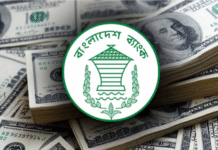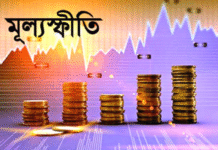The Bangladesh Bank has taken a move to bring about major changes in the definition of loan default to address the growing bad loan.
A committee headed by central bank general manager AKM Amjad Hussain is now working on the matter, officials said.
The central bank formed the committee on January 31 following a meeting between finance minister AHM Mustafa Kamal and Bangladesh Bank governor Fazle Kabir on January 13 that mainly focused on policy changes to check defaulted loans, they said.
The committee was asked to submit recommendations on a number of issues like the guideline on defaulted loan and the definition of bad loan and increase in the shareholding percentage so that shareholders having up to 20 per cent, which is in the law, could not be considered loan defaulters.
In its meeting in the past week, the committee discussed the possibility of extension of the time frame for declaring a defaulted, meeting sources said.
According to the existing provision, a loan is to be declared defaulted for failure to pay the instalments for nine months for a short term loan and 18 months for a long term loan.
Central bank spokesperson Serajul Islam told New Age on Saturday that it was too early to say what type of changes would be recommended by the committee.
The committee might suggest further stringent claws with the definition of the defaulted loan, he said.
On February 6, the central bank relaxed the policy for loan write-off enabling the banks to erase loan up to Tk 200,000 instead of the exiting Tk 50,000 without starting any case, triggering criticism from bankers and economists as it helped cut default loans by a big margin artificially.
Defaulted loans rose by more than fourfold until 2018 the last year of the successive second tenure of the Awami League-led government amidst series of loan scams in the state-owned banks.
Bad loans grew at Tk 93,911.4 crore in 2018 from Tk 22,482 crore in 2009. It has already been identified as the major problem of the country’s banking sector by Mustafa Kamal on a number of occasions since his assuming the officer of the finance minister in January.
In 2018, bad loans in the state-owned commercial banks — Sonali Bank, Janata Bank, Agrani Bank, Rupali Bank, Bangladesh Development Bank and BASIC Bank — increased by 29.81 per cent or Tk 11,369.87 to Tk 48,695.87 crore from Tk 37,326 crore at the end of December 2017.
In the private commercial banks, classified loans increased by 29.74 per cent or Tk 8,743 crore to Tk 38,139.85 crore (40.61 per cent of the country’s total defaulted loans) from Tk 37,326 crore.
On December 7, local think-tank Centre for Policy Dialogue said in a report that a total of Tk 22,502 crore was plundered from the country’s banking sector through major scams, irregularities and heists in the last one decade.
Former Bangladesh Bank deputy governor Ibrahim Khaled expressed hope that the committee would come up with viable options to deal with bad loans.
Relaxing policy on bad loan like that of loan write-off would not help the government to address the bad loan culture in the long run, he noted.
The officials said that the committee was working under another committee headed by deputy governor Ahmed Jamal formed to review the existing laws on defaulted loan, banking companies and bankruptcy.
AKM Amjad Hussain said that the committee members so far sat only once in the past week and reviewed its terms of reference.
He declined to disclose the issues discussed, but admitted that the task was huge.
He said that their recommendations would be examined by the committee led by deputy governor before sending those to the financial institutions division.
He said that they were not certain how many days they would need to prepare the recommendations.
The officials said that the central bank took a move in early 2000 to bring about changes in the definition of defaulted loan.
It, however, backtracked on the decision because of reservation given by the International Monetary Fund citing that such practice was contrary to the international norm.
Source: New Age.









